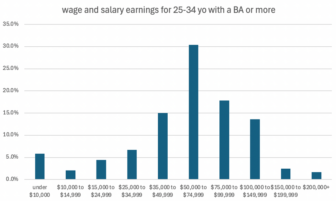
Thank you Chair Irwin and members of the Senate Housing and Human Services Committee for the opportunity to talk to you about child care and our working parents tax cut recommendation.
Thank you Senator McDonald Rivet for your leadership on the issue.
For more than three decades, Michigan Future, Inc. has championed common sense and forward-looking policy initiatives grounded in data analysis, rather than ideology. Our primary objective is the restoration of Michigan’s status as a high-prosperity state with a thriving middle class.
Central to our mission is the establishment of a market economy that benefits all Michiganders. We are dedicated to developing an economy where every worker in Michigan enjoys wages and benefits that allow them to meet their financial needs, save for the future, and invest in their children’s education. Michigan’s success is dependent on ensuring our residents can thrive. As Michigan’s economy grows, so should the income of Michigan workers. It’s that simple.
To help meet that goal three years ago, the Michigan Future Board proposed that the state expand its Earned Income Tax Credit (EITC) tenfold. Going from a six percent match of the federal credit to sixty. The rationale for this transformational recommendation was our belief that Michigan needed a completely new approach to improving the economic well-being of working families. That far too many struggling working families was an ongoing reality of the Michigan economy.
Nearly six-in-ten Michigan jobs pay less than what is required for a family of three to be middle class. These low-wage workers live paycheck to paycheck not because they are irresponsibly buying “unnecessary”luxuries, but because they are in lower-wage jobs that leave them struggling to pay for necessities. The reality is that most of those struggling economically––in good times and bad––like us get up every day and work hard to earn a living.
At Michigan Future we believe the best way to help these hard-working Michiganders is with income, not programs. Parents are the best decision makers for what is best of their families and their children.
2023 saw a historic expansion of the state’s match of the federal EITC with the enactment of the Working Families Tax Credit. The Working Families Tax Credit is a huge first step in moving to an income-based support system for Michigan’s working ALICE households.
But there is more that needs to be done. The data are clear: you cannot have an economy that benefits all without increasing the income of lower-wage workers––particularly those raising young children––in their current jobs.
As a next step, we recommend enactment of a life-changing working parents tax cut: a substantial fully refundable tax credit for each child under the age of six for EITC recipient households.
A per child tax cut is the only way to help Michigan families raising young children at scale. A per child credit up to age six would help Michigan families raising approximately 250,000 children. By comparison the state’s current child care subsidy serves around 40,000 Michigan children. The tri-share program is currently serving around 700.
And it is the best way to confront three seemingly intractable challenges that have bedeviled policymakers for decades: the benefit cliff, the difficulty of lower-wage workers to pay for child care and far too many working households shutout of benefits they are eligible for by a confusing, bureaucratic system of safety net programs.
Our detailed analysis of the benefit cliff found that many households with children realized very little income gain as they earn more at work as declining benefits and increasing taxes steeply offset increased earnings. This is particularly true for households with income above $20,000. Where households net as little as 14 cents from each additional dollar earned.
The best antidote for this high tax rate cliff is a flat per child credit that does not decline as you earn more money. The working parents tax cut is designed so that recipients will be able to keep a substantial proportion of increases in work earnings.
Focusing on households raising young children is also an essential component of the proposal. The Michigan Association of United Ways estimates the cost of paying for basic necessities for a two-adult household with no children is $38,508; for a household of two adults and two school age children it is $62,928; and for a household of two adults with two preschool children it is $72,792. The cost of childcare is the main driver of the increased cost of raising preschool children.
And unlike benefit programs, the working parents tax cut will be easy to qualify for and apply for.
Expanded state tax credits for recipients of the federal EITC should be the cornerstone of a transformation in how the state supports working families. Moving away from a program-based support system to a cash-based safety net that benefits far more working families than any program can and that provides working families with increased income to pay the bills and save for emergencies, retirement, and the kids’ education.
The working parents tax cut would be life changing for households raising young children. Our recommendation encourages work and provides a significant boost in income. Unfortunately, the challenge that has long faced too many working Michigan families is not bad decision-making, but the lack of sufficient income that can open doors of opportunity. A working parents tax cut would empower parents to spend the money however best meets the needs of their family. It will be easy to apply and qualify, and a tax cut will benefit far more working families than any program could.
The working parents tax cut also benefits employers both by pulling more parents into the labor market and by increasing hours worked. The economic benefit is huge: the U.S. Chamber of Commerce Foundation estimates the difficulty of lower-wage workers to pay for childcare costs the Michigan economy three billion dollars annually.
We fully understand the implications of a big new tax credit. At its core, the state budget is a statement of our values. We believe that the state’s core economic value should be rising income for all: an economy that as it grows benefits all. We value work and we value work where anyone who works hard earns enough to pay for the basics and to save for emergencies, retirement, and the kids’ education.
By both incentivizing working and rewarding work, a working parents tax cut is a win for Michigan families raising young children, employers, and the overall state economy. Our recommendation would help fill jobs, boost small businesses, expand our economy, and give a chance for hundreds of thousands of Michigan parents to make a better life for themselves and their children.
A working parents tax cut meets all the criteria of good tax policy. It is fair (targeting relief to those most in need), efficient (tied directly as an incentive to work), and simple (no new bureaucracy).







